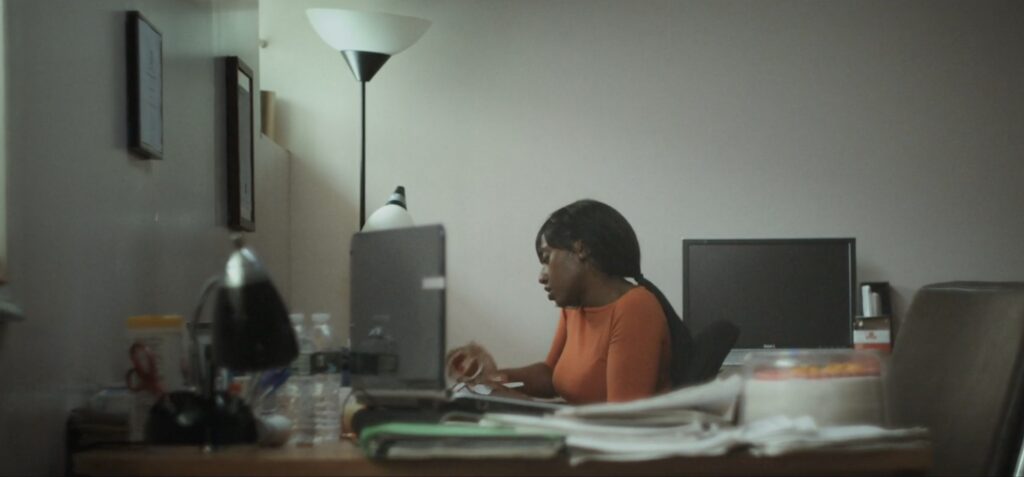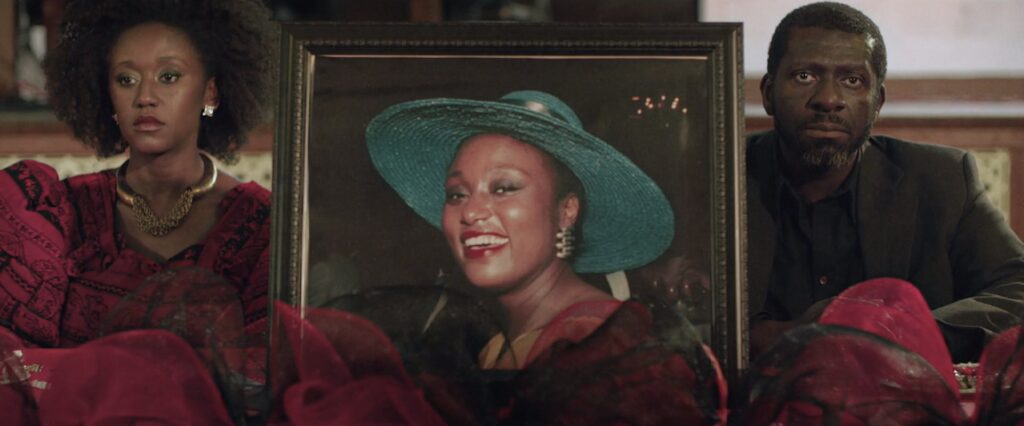From the very first moment, Queen of Glory immerses you in the sights and sounds of drums, colourful Ghanaian fabrics, and traditional dance – which we later learn are part of funeral rites. The drive of this story is clear from the beginning: we are thrown into the life of Ghanaian-American woman Sarah Obeng (played by the film’s writer-director Nana Mensah, best known for her performance in Netflix’s The Chair), watching as she resists her aunties’ request to weigh her on a scale, seeing her awkward interactions with fellow STEM graduate students, and slowly learning about her illicit affair with a fellow, white graduate student, named Lyle (Adam Leon).

Sarah wants to take flight. She yearns to leave her graduate program in molecular biology at Columbia University to move to Ohio with Lyle, who is separated from his wife. A brief phone call with her mother, Grace, also reveals the distance she wants to maintain from her childhood community in the Bronx.
But her wings are seemingly clipped when she receives the sudden news of her mother’s death. And it is from this moment that all expectations of leaving behind New York, nosey aunties, and her graduate program are blown up – and, in the rubble of her mother’s death, Sarah becomes saddled with her mother’s home, a host of funereal and familial responsibilities, as well as a local Christian bookstore aptly called King of Glory. It’s at this bookstore that Sarah’s life unfolds and unravels; it also becomes an unexpected place of redemption, a medium through which Sarah learns more about her mother – and herself – than she ever imagined she would.

After watching Mensah’s directorial debut, it is no wonder this film won Best New Narrative Director at the 2021 Tribeca Film Festival. Queen of Glory is funny and quick-witted, playing up the awkwardness of the balance Sarah must strike in bringing her mother’s life to a respectful, beautiful end while also honouring her personal ambitions. Queen of Glory is so (almost uncannily) real, luxuriating in human life’s messy, loud, uneven pace.
Mensah also utilises every inch of her frame; fore- and backgrounds are filled with impatient children, the bustling habits of street life, and the hazy movements of customers. Montages of Sarah’s life, a documentary film of Ghanaian travel and events, the constant thrum of music and fast-paced conversations enrich Queen of Glory’s rumination on the ever-shifting balancing act between obligations that Sarah must attend to following her mother’s death.

Every character is pitch-perfectly cast in this comedy of errors, from Orlando (or “Pitt”, played by Meeko), the face-tatted former felon who found salvation working at Sarah’s mother’s bookstore, to Tanya (Anya Migdal), a very pregnant Russian-American housewife who, at one point, induces her third birth with a glass of wine.
Further accolades must be given to Oberon K.A. Adjepong for his portrayal of Sarah’s estranged father, Godwin. The tension between Sarah and Godwin is deliciously frustrating, demonstrated in their constant butting of heads over the funeral services –their communication breakdown and growing divide are viscerally rendered through cinematographic devices. Each of these figures illuminates Sarah’s path – even if that path eventually diverges from her plans of selling all the properties and cutting ties with her family forever.

Mensah’s development of Sarah’s character is artful, uncomfortable, and sincere. Sarah Obeng is introduced as someone seeking escape, but by the time of her mother’s funeral, when she spills her first ugly tears of mourning, we see a Sarah whose newfound hope is to sow seeds of connection in the very last place she wanted to be. Just as this film begins in the middle of a pivotal event, Queen of Glory ends mid-act. That incompleteness is, ironically, utterly fulfilling, marked by sardonic dialogue and an unexpected outcome.
Queen of Glory releases in UK cinemas from August 26th.
